Christian Books
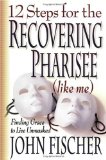 12
Steps for the Recovering Pharisee (like me): Finding Grace to
Live Unmasked, John Fischer,
2000. Fischer uses a tongue-in-cheek 12-step model for
recovery from the spiritually deadly disease of performance based
righteousness and elitism. The medicine goes down smoothly with a
healthy dose of humor.
Here is the chart of Fischer's application of the 12 steps.
12
Steps for the Recovering Pharisee (like me): Finding Grace to
Live Unmasked, John Fischer,
2000. Fischer uses a tongue-in-cheek 12-step model for
recovery from the spiritually deadly disease of performance based
righteousness and elitism. The medicine goes down smoothly with a
healthy dose of humor.
Here is the chart of Fischer's application of the 12 steps.
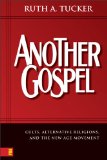 Another Gospel: Cults, Alternative Religions and the New Age
Movement, Ruth A. Tucker.
Brinda M. (Tuscola Assembly) said, "Though it did not have anything
specific about the Geftakys ministry, it was very helpful in seeing
that much of George’s ministry was 'cultish'".
Another Gospel: Cults, Alternative Religions and the New Age
Movement, Ruth A. Tucker.
Brinda M. (Tuscola Assembly) said, "Though it did not have anything
specific about the Geftakys ministry, it was very helpful in seeing
that much of George’s ministry was 'cultish'".
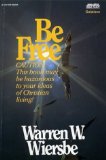 Be Free: Galatians,
Warren Wiersbe. Brent T. says, "This is an excellent
commentary on the book of Galatians, that is just right for people
coming out of the Assembly. The back cover reads: 'In order
to be a better Christian, I must_______. How a person answers that
question is all important.' This book debunks the false,
performance based teaching promulgated by George, and the book is easy
to read."
Be Free: Galatians,
Warren Wiersbe. Brent T. says, "This is an excellent
commentary on the book of Galatians, that is just right for people
coming out of the Assembly. The back cover reads: 'In order
to be a better Christian, I must_______. How a person answers that
question is all important.' This book debunks the false,
performance based teaching promulgated by George, and the book is easy
to read."
 Boundaries: When To Say Yes, When to Say No to Take Control of Your
Life,
Dr. Henry Cloud &s Dr. John Townsend, 1992. The Assembly
system intentionally militated to break down normal boundaries in
peoples lives. The concepts and examples in this book are extremely
helpful to recognize where the issues lie and change course. There
is an accompanying workbook.
Boundaries: When To Say Yes, When to Say No to Take Control of Your
Life,
Dr. Henry Cloud &s Dr. John Townsend, 1992. The Assembly
system intentionally militated to break down normal boundaries in
peoples lives. The concepts and examples in this book are extremely
helpful to recognize where the issues lie and change course. There
is an accompanying workbook.
By Hook or by Crook: How Cults Lure Christians Harold L. Bussell, 1993 [originally published as Unholy Devotion: Why Cults Lure Christians]. Dr. Bussell's perspective is that evangelicals are seldom attracted to aberrational Christian groups because of their doctrine; rather, the appeal is the promise of "something more", a perceived "spirituality".
 Churches That Abuse,
Dr. Ronald Enroth, 1992. This book has an
entire chapter about the Geftakys Assembly.
The account is factual except that the names of the couple have been
changed. They were the first to begin to publicly talk about the
abusive practices of the Assembly and its main leader, George Geftakys. This book identifies abusers, shows how their techniques
operate and the consequences in peoples' lives.
Margaret
Thaler Singer: "This is the most sophisticated, in-depth
presentation yet made of the psychological and spiritual
consequences of what various pastoral and church-group abuses
produce." This book is now
available online in PDF format.
Churches That Abuse,
Dr. Ronald Enroth, 1992. This book has an
entire chapter about the Geftakys Assembly.
The account is factual except that the names of the couple have been
changed. They were the first to begin to publicly talk about the
abusive practices of the Assembly and its main leader, George Geftakys. This book identifies abusers, shows how their techniques
operate and the consequences in peoples' lives.
Margaret
Thaler Singer: "This is the most sophisticated, in-depth
presentation yet made of the psychological and spiritual
consequences of what various pastoral and church-group abuses
produce." This book is now
available online in PDF format.
 Cult Proofing Your Kids,
Paul R. Martin,
1993. Whether or not you are comfortable with the "cult" word,
this book includes a lot of information that is very helpful to
people from the Assembly, especially the chapters on the healthy
family, parenting tips, developing critical thinking, changing
family dynamics and a "cult susceptibility" questionnaire. The
chapter, "Pitfalls to Recovery," has great information on the issues
and stages of recovery. Dr. Martin, who founded and runs
Wellspring Retreat, was himself a former member of a totalistic
Christian group. The preface to the book is
available online.
Cult Proofing Your Kids,
Paul R. Martin,
1993. Whether or not you are comfortable with the "cult" word,
this book includes a lot of information that is very helpful to
people from the Assembly, especially the chapters on the healthy
family, parenting tips, developing critical thinking, changing
family dynamics and a "cult susceptibility" questionnaire. The
chapter, "Pitfalls to Recovery," has great information on the issues
and stages of recovery. Dr. Martin, who founded and runs
Wellspring Retreat, was himself a former member of a totalistic
Christian group. The preface to the book is
available online.
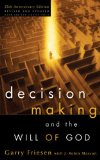 Decision Making and the Will of God: A Biblical Alternative to the
Traditional View, Garry Friesen,
1980. This book will clear up a lot of misconceptions about
the will of God as it relates to our everyday life. Because of
the assembly practice of seeking and giving counsel on everything
from dating to pierced ears, this is an area we all need light on.
A very clear, very Biblical presentation.
Decision Making and the Will of God: A Biblical Alternative to the
Traditional View, Garry Friesen,
1980. This book will clear up a lot of misconceptions about
the will of God as it relates to our everyday life. Because of
the assembly practice of seeking and giving counsel on everything
from dating to pierced ears, this is an area we all need light on.
A very clear, very Biblical presentation.
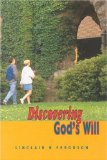 Discovering God's Will, Sinclair
Ferguson, 1996. A brief little book with a pastoral tone
on how to use the Bible for guidance. Develops three main points:
Look for clear commands, look for principles, and look for examples
and illustrations. The ACE website has a
review
of this helpful little book. The last paragraph of the review is
great: "Often, when people say they want to know God’s will for
their lives, they mean that they want to be assured that everything
will go as they plan, without difficulty or trial. One thing
we can be sure about God’s will is that this is not his plan.
Instead of seeking relief from the prospect of difficulty or worldly
failure, Christians should instead seek to honor God with decisions
that are obedient to his Word, trusting him to make all our
seemingly twisted paths straight in his loving care of our lives."
Discovering God's Will, Sinclair
Ferguson, 1996. A brief little book with a pastoral tone
on how to use the Bible for guidance. Develops three main points:
Look for clear commands, look for principles, and look for examples
and illustrations. The ACE website has a
review
of this helpful little book. The last paragraph of the review is
great: "Often, when people say they want to know God’s will for
their lives, they mean that they want to be assured that everything
will go as they plan, without difficulty or trial. One thing
we can be sure about God’s will is that this is not his plan.
Instead of seeking relief from the prospect of difficulty or worldly
failure, Christians should instead seek to honor God with decisions
that are obedient to his Word, trusting him to make all our
seemingly twisted paths straight in his loving care of our lives."
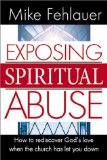 Exposing Spiritual Abuse: How to Rediscover God's Love When the
Church Has Let You Down, Mike
Fehlauer. The chapter on "Toxic Love" is about the
excessive devotion of people looking for a father-figure. There are
two good chapters on positive and negative characteristics to look
for in a pastor.
Warning Signs of an Unhealthy Church - Part 1,
Part 2,
Part 3 are excerpts from the book.
Exposing Spiritual Abuse: How to Rediscover God's Love When the
Church Has Let You Down, Mike
Fehlauer. The chapter on "Toxic Love" is about the
excessive devotion of people looking for a father-figure. There are
two good chapters on positive and negative characteristics to look
for in a pastor.
Warning Signs of an Unhealthy Church - Part 1,
Part 2,
Part 3 are excerpts from the book.
 Families Where Grace Is In Place: Getting Free from the Burden of
Pressuring, Controlling and Manipulating Your Spouse and Your
Children, Jeff VanVonderen,
1992. "Here is a message about how God's grace can transform
relationships within a marriage and family. The first step is
learning the simple difference between God's job and ours... Healthy
relationships between husband and wife, between parents and
children, are possible only when the filter of God's grace is placed
over the processes of marriage and parenting. The Christian family's
ultimate goals can be arrived at without using legalistic and
manipulative methods." (Quoted from the back of the book.)
Families Where Grace Is In Place: Getting Free from the Burden of
Pressuring, Controlling and Manipulating Your Spouse and Your
Children, Jeff VanVonderen,
1992. "Here is a message about how God's grace can transform
relationships within a marriage and family. The first step is
learning the simple difference between God's job and ours... Healthy
relationships between husband and wife, between parents and
children, are possible only when the filter of God's grace is placed
over the processes of marriage and parenting. The Christian family's
ultimate goals can be arrived at without using legalistic and
manipulative methods." (Quoted from the back of the book.)
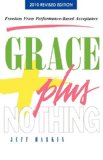 Grace Plus Nothing,
Jeff Harkin. Recommended by Brinda M..
Read several chapters online at graceandmercy.org.
Grace Plus Nothing,
Jeff Harkin. Recommended by Brinda M..
Read several chapters online at graceandmercy.org.
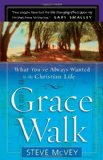
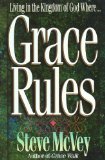 Grace
Walk: What You've Always Wanted in the Christian Life, and
Grace Rules: Living in the Kingdom of God,
Steve McVey. Recommended by Jack H.: "These two books go into
detail about the dangers and subtleties of legalism, and how
important and wonderful grace really is." McVey uses his own journey
from legalism into grace to show believers how to get off the
performance roller coaster.
Grace
Walk: What You've Always Wanted in the Christian Life, and
Grace Rules: Living in the Kingdom of God,
Steve McVey. Recommended by Jack H.: "These two books go into
detail about the dangers and subtleties of legalism, and how
important and wonderful grace really is." McVey uses his own journey
from legalism into grace to show believers how to get off the
performance roller coaster.
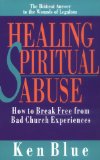 Healing Spiritual Abuse: How to Break Free from Bad Church
Experiences, Ken Blue,
1993. There is a great chapter on "Healed By Grace". He says,
"When we see that we are completely accepted by God solely through
the life, death and resurrection of Jesus, all religious law loses
its manipulative power over us."
Healing Spiritual Abuse: How to Break Free from Bad Church
Experiences, Ken Blue,
1993. There is a great chapter on "Healed By Grace". He says,
"When we see that we are completely accepted by God solely through
the life, death and resurrection of Jesus, all religious law loses
its manipulative power over us."
Online book The Heresy of Mind Control: Recognizing Con Artists in Leadership, Stephen Martin, M.Div,, online book. Written by Dr. Paul Martin's brother, this 169-page e-book shows how "wolves in sheeps' clothing" use Lifton's 8 elements of mind control to create Christian totalism.
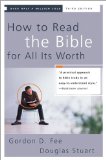 How to Read the Bible for All It's Worth: A Guide to Understanding
the Bible, Gordon D. Fee
&s
Douglas Stuart, 1982. Dave Sable says: “One day years
ago after I left a seminar meeting, still spiritually hungry and
muddled in thought, I wandered into a Christian bookstore and came
across this book. It revolutionized my thinking about the Bible.
How to Read the Bible for All It's Worth: A Guide to Understanding
the Bible, Gordon D. Fee
&s
Douglas Stuart, 1982. Dave Sable says: “One day years
ago after I left a seminar meeting, still spiritually hungry and
muddled in thought, I wandered into a Christian bookstore and came
across this book. It revolutionized my thinking about the Bible.
Two scholars who love the Lord and wanted to acquaint believers with basic ground rules for interpreting Scripture wrote it. It has a great chapter on the use of Parables as well as dealing with historical narratives, the book of Acts, prophecy, the law, Revelation and other writing styles incorporated in God's word.
This book discusses some basic ground rules and restraints we need to follow when seeking to interpret the Bible. I believe it should be required reading for all believers and especially those in leadership who have teaching responsibilities [take note, former Geftakys Assembly leaders who are still leading!]. I heartily recommend that you read and study this book." Joe Sperling also recommends this book.
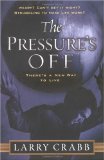 The Pressure's Off: There's a New Way to Live,
Dr. Larry Crabb. Connie Wellik, formerly of the Fullerton
Assembly, says this book was "extremely helpful to me in my journey
of recovery from spiritual abuse," along with
Shattered Dreams
The Pressure's Off: There's a New Way to Live,
Dr. Larry Crabb. Connie Wellik, formerly of the Fullerton
Assembly, says this book was "extremely helpful to me in my journey
of recovery from spiritual abuse," along with
Shattered Dreams
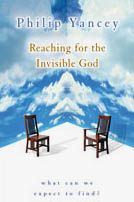 Reaching for the Invisible God. Phil
Yancey at his best--wrestling with difficult questions and
refusing to give pat answers. In our quest to know God, he offers
this caveat: "The more personal conception of God we have, the more
unnerving are the questions about him." He "invites readers to
travel through some of the most difficult aspects of nurturing a
human relationship with a transcendent God."
Reaching for the Invisible God. Phil
Yancey at his best--wrestling with difficult questions and
refusing to give pat answers. In our quest to know God, he offers
this caveat: "The more personal conception of God we have, the more
unnerving are the questions about him." He "invites readers to
travel through some of the most difficult aspects of nurturing a
human relationship with a transcendent God."
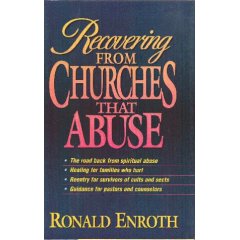 Recovering From Churches That Abuse,
Dr. Ronald Enroth, 1994. The message of
this book is that "mending" is possible. He makes the
point that as the damage was relational, the healing must also be
relational. Again Dr. Enroth devotes a chapter to the Assembly. One
very helpful aspect of both of Dr. Enroth's books is seeing
similarities between the Assembly and other hurtful Christian
groups. Recovering from Churches that Abuse is now
available
online in PDF format.
Recovering From Churches That Abuse,
Dr. Ronald Enroth, 1994. The message of
this book is that "mending" is possible. He makes the
point that as the damage was relational, the healing must also be
relational. Again Dr. Enroth devotes a chapter to the Assembly. One
very helpful aspect of both of Dr. Enroth's books is seeing
similarities between the Assembly and other hurtful Christian
groups. Recovering from Churches that Abuse is now
available
online in PDF format.
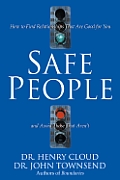 Safe People: How to Find Relationships That Are Good for You and
Avoid Those That Aren't!,
Dr. Henry Cloud &s Dr. John Townsend, 1995. Henry tells
about being in a Christian group for 5 years where he learned a lot
but became more "religious" and less "real". This was not a safe
group. Later, after several failed relationships, he got counseling
and learned how to recognize people who seemed very spiritual but
were not "real". Thereafter, he says, "I was able to pick better
friends, people who really knew God and His ways instead of a lot of
religious language and activities - truly relational people who were
able to understand and love others and were honest about themselves
and about life."
Safe People: How to Find Relationships That Are Good for You and
Avoid Those That Aren't!,
Dr. Henry Cloud &s Dr. John Townsend, 1995. Henry tells
about being in a Christian group for 5 years where he learned a lot
but became more "religious" and less "real". This was not a safe
group. Later, after several failed relationships, he got counseling
and learned how to recognize people who seemed very spiritual but
were not "real". Thereafter, he says, "I was able to pick better
friends, people who really knew God and His ways instead of a lot of
religious language and activities - truly relational people who were
able to understand and love others and were honest about themselves
and about life."
 Shattered Dreams: God's Unexpected Path to Joy,
Dr. Larry Crabb.
Highly recommended by Connie Wellik, formerly of the Fullerton
Assembly, along with The Pressure's Off.
Shattered Dreams: God's Unexpected Path to Joy,
Dr. Larry Crabb.
Highly recommended by Connie Wellik, formerly of the Fullerton
Assembly, along with The Pressure's Off.
 Soul Repair: Rebuilding Your Spiritual Life,
Jeff VanVonderen, Dale and Juanita Ryan.
The authors don't pretend to have a silver bullet for spiritual
malaise, but they give a lot of tools to use to rebuild a
relationship with God - very thought provoking. This book is
must-read if you are recovering from spiritual abuse!
Soul Repair: Rebuilding Your Spiritual Life,
Jeff VanVonderen, Dale and Juanita Ryan.
The authors don't pretend to have a silver bullet for spiritual
malaise, but they give a lot of tools to use to rebuild a
relationship with God - very thought provoking. This book is
must-read if you are recovering from spiritual abuse!
 The Subtle Power of Spiritual Abuse: Recognizing and Escaping
Spiritual Manipulation and False Spiritual Authority in the Church,
David Johnson and
Jeff VanVonderen, 1991. According to the authors, “Spiritual
abuse can occur when a leader uses his or her spiritual
position to control or dominate another person. It often
involves overriding the feelings and opinions of another, without
regard to what will result in the other person's state of living,
emotions or spiritual well-being. In this application, power is used
to bolster the position or needs of a leader, over and above one who
comes to them in need.”
The Subtle Power of Spiritual Abuse: Recognizing and Escaping
Spiritual Manipulation and False Spiritual Authority in the Church,
David Johnson and
Jeff VanVonderen, 1991. According to the authors, “Spiritual
abuse can occur when a leader uses his or her spiritual
position to control or dominate another person. It often
involves overriding the feelings and opinions of another, without
regard to what will result in the other person's state of living,
emotions or spiritual well-being. In this application, power is used
to bolster the position or needs of a leader, over and above one who
comes to them in need.”
Mark Campbell writes: “I hope one of the books that you have, or are going to read, is The Subtle Power of Spiritual Abuse. I think this is the best book in describing the way the abusive system works; I underlined about every word in the book!”
Brent T. writes: “Of all the ones on the topic, I thought this one was the best." Here is a summary of part of the book on the web that gives a quick overview of this excellent book. The "Recovering Grace" blog has a series of posts covering the book. Also see tape conference on spiritual abuse by these authors in the Media section of this site.
 Spiritual Depression: Its Causes and Its Cure,
Dr. Martyn Lloyd-Jones, 1965. Gently but firmly addresses
potential causes including inability to receive forgiveness for all
sins, not moving beyond past failures, seeing only bad and not good,
not recognizing false teaching, lack of faith, not seeing trials
correctly, etc. This older book stays centered on Biblical
solutions. Very helpful.
Spiritual Depression: Its Causes and Its Cure,
Dr. Martyn Lloyd-Jones, 1965. Gently but firmly addresses
potential causes including inability to receive forgiveness for all
sins, not moving beyond past failures, seeing only bad and not good,
not recognizing false teaching, lack of faith, not seeing trials
correctly, etc. This older book stays centered on Biblical
solutions. Very helpful.
 Tired of Trying to Measure Up: Getting Free from the Demands,
Expectations and Intimidations of Well-Meaning People,
Jeff VanVonderen, 1989. Unmask the lies that kept you on
the works-righteousness treadmill, discover the liberation of the
Gospel of grace in Jesus Christ and the rest that comes through what
Christ had done on the cross.
Tired of Trying to Measure Up: Getting Free from the Demands,
Expectations and Intimidations of Well-Meaning People,
Jeff VanVonderen, 1989. Unmask the lies that kept you on
the works-righteousness treadmill, discover the liberation of the
Gospel of grace in Jesus Christ and the rest that comes through what
Christ had done on the cross.
 Toxic Faith - Understanding and Overcoming Religious Addiction,
Steve Arterburn and Jack Felton, 1991. In spite of the
unlikely title, there is a lot of truth in this book. The sequel,
More Jesus, Less Religion, focuses less on spiritual abuse and
more on the need for promoting healthy faith. Mark Campbell's
brief article,
Defense Mechanisms of Addicts, touches on some of the same
themes.
Toxic Faith - Understanding and Overcoming Religious Addiction,
Steve Arterburn and Jack Felton, 1991. In spite of the
unlikely title, there is a lot of truth in this book. The sequel,
More Jesus, Less Religion, focuses less on spiritual abuse and
more on the need for promoting healthy faith. Mark Campbell's
brief article,
Defense Mechanisms of Addicts, touches on some of the same
themes.
Soon after I read the book in 1990 I happened to see Jim Hayman in the bank and recommended it to him. His response was, "Toxic faith! That's a terrible title. How can faith possibly be toxic?" Maybe for some it wasn't, but for us the description was spot on. It was "faith" that went far beyond the gospel to create an obsessive mentality and lifestyle that caused many of us to do things we would never have done in our right minds.
 Transforming Grace: Living Confidently in God's Love,
Jerry Bridges
1991. Recommended by Brinda M. (Tuscola). As one reviewer says,
Bridges shows that Biblical grace is "God's riches at Christ's
expense".
Transforming Grace: Living Confidently in God's Love,
Jerry Bridges
1991. Recommended by Brinda M. (Tuscola). As one reviewer says,
Bridges shows that Biblical grace is "God's riches at Christ's
expense".
 Traveling Mercies: Some Thoughts on Faith ,
Anne Lamott,
2000. As one reader commented on Amazon, "Not for the faint of
heart!" Another said, "Worst book ever." True, Lamott writes with a
lot of hilarious profanity and irreverence. But another Amazon
reader commented, "This book brought me back to God." Lamott is
real, down to earth, and, on the Christian spectrum, probably as far
as it is possible to go in the opposite direction from the Assembly.
Which works for some who need to approach God again sideways if
they're going to approach at all.
Traveling Mercies: Some Thoughts on Faith ,
Anne Lamott,
2000. As one reader commented on Amazon, "Not for the faint of
heart!" Another said, "Worst book ever." True, Lamott writes with a
lot of hilarious profanity and irreverence. But another Amazon
reader commented, "This book brought me back to God." Lamott is
real, down to earth, and, on the Christian spectrum, probably as far
as it is possible to go in the opposite direction from the Assembly.
Which works for some who need to approach God again sideways if
they're going to approach at all.
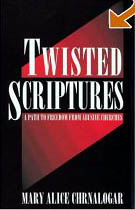 Twisted Scriptures: A Path to Freedom from Abusive Churches,
Mary Alice Chrnalogar, 1997. By wielding distorted Scripture,
controlling groups keep earnest believers struggling under the
terrible tyranny of oppression, guilt, and fear. The author says, "This
book will take you into the inner workings of abusive and
controlling groups to show you how they control their members. I
will make clear the mind games that many of the major destructively
controlling groups have in common." Checklists at the
end of each chapter offer good topics for discussion. Ms. Chrnalogar
is herself a former member of an aberrational Christian group.
Twisted Scriptures: A Path to Freedom from Abusive Churches,
Mary Alice Chrnalogar, 1997. By wielding distorted Scripture,
controlling groups keep earnest believers struggling under the
terrible tyranny of oppression, guilt, and fear. The author says, "This
book will take you into the inner workings of abusive and
controlling groups to show you how they control their members. I
will make clear the mind games that many of the major destructively
controlling groups have in common." Checklists at the
end of each chapter offer good topics for discussion. Ms. Chrnalogar
is herself a former member of an aberrational Christian group.
 We Would See Jesus, Roy and Revel Hession,1958,
re-issued by CLC in 2005. A brief read, a perennial classic that has
withstood the test of time. Read the Amazon reviews.
We Would See Jesus, Roy and Revel Hession,1958,
re-issued by CLC in 2005. A brief read, a perennial classic that has
withstood the test of time. Read the Amazon reviews.
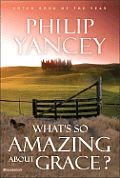 What's So Amazing About Grace, Phil
Yancey. "Psalm51", a poster on the Assembly bulletin board,
said, "Philip Yancey's books were a catalyst for me in my
exit from the assemblies. I highly recommend them, especially
Soul Survivor: How 13 Unlikely Mentor's Helped My Faith Survive the
Church and What's So Amazing About Grace. He has
incredible insights about the human condition, and our need for
grace for ourselves and towards others." We would add
Reaching for the Invisible God,
Disappointment with God: Three Questions No One Asks Aloud,
and
Prayer: Does It Make Any Difference?. Yancey is so honest
and down to earth. Reading him really disarms Assembly grandiosity
and perfectionism.
What's So Amazing About Grace, Phil
Yancey. "Psalm51", a poster on the Assembly bulletin board,
said, "Philip Yancey's books were a catalyst for me in my
exit from the assemblies. I highly recommend them, especially
Soul Survivor: How 13 Unlikely Mentor's Helped My Faith Survive the
Church and What's So Amazing About Grace. He has
incredible insights about the human condition, and our need for
grace for ourselves and towards others." We would add
Reaching for the Invisible God,
Disappointment with God: Three Questions No One Asks Aloud,
and
Prayer: Does It Make Any Difference?. Yancey is so honest
and down to earth. Reading him really disarms Assembly grandiosity
and perfectionism.
 Why Grace Changes Everything, Chuck
Smith. Brent T. says, "This book is a real gem. It is very
simple, with plenty of real life examples. There is clear exposition
of the Biblical doctrine of grace, but it is done in a way that you
will want to read the book in one sitting. While this book should
not be construed as a heavy theological text, it is a perfect place
to start learning about the grace of God, which is so wonderfully
different than the concepts taught by George Geftakys."
Why Grace Changes Everything, Chuck
Smith. Brent T. says, "This book is a real gem. It is very
simple, with plenty of real life examples. There is clear exposition
of the Biblical doctrine of grace, but it is done in a way that you
will want to read the book in one sitting. While this book should
not be construed as a heavy theological text, it is a perfect place
to start learning about the grace of God, which is so wonderfully
different than the concepts taught by George Geftakys."
 Without a Doubt, Kenneth R. Samples. Not
exactly related to spiritual abuse, but it's a great little resource
to bolster wavering faith. "One of the unique aspects of
Christianity is that it stands up to honest intellectual scrutiny...Without
a Doubt
covers questions on everything from the doctrine of the incarnation
to religious pluralism, from evolution to moral relativism, with
rational answers for even the most stubborn skeptic."
Without a Doubt, Kenneth R. Samples. Not
exactly related to spiritual abuse, but it's a great little resource
to bolster wavering faith. "One of the unique aspects of
Christianity is that it stands up to honest intellectual scrutiny...Without
a Doubt
covers questions on everything from the doctrine of the incarnation
to religious pluralism, from evolution to moral relativism, with
rational answers for even the most stubborn skeptic."
Addendum: We are sometimes asked why we don't recommend books by Gene Edwards - Letters to a Devastated Christian and A Tale of Three Kings. We read those books after we left in 1990, and they resonated, in the sense that they described a lot of what we had experienced. However, they were confusing, because they have two serious weaknesses. First, they blame the victim too much, failing to take into account the deception that takes place; and second, they are soft on the abusers. A look at Gene Edwards' own ministry may reveal why this is the case. Kevin Knox of "The Familyhood Church" blog has a series of posts about his ten years under Edwards' ministry. Strangely familiar in many ways!
